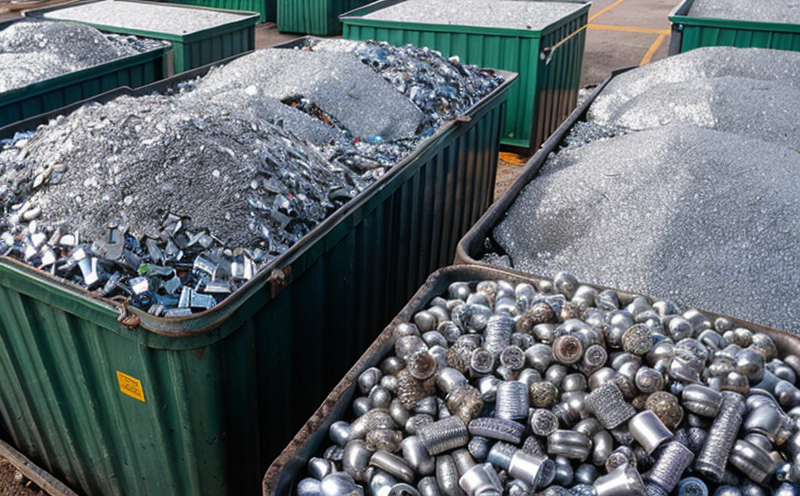ASTM E173 Weldability of Recycled Metal Materials
The ASTM E173 standard is widely used to evaluate the weldability properties of recycled metal materials, ensuring that these materials can be reliably welded into products without compromising their performance or safety. This service is crucial in sectors such as automotive manufacturing, construction, and aerospace, where high-quality, durable components are essential.
Weldability testing under ASTM E173 involves several key steps. Firstly, the recycled metal material must undergo thorough preparation, which includes cleaning, deburring, and shaping to standard dimensions. The specimen is then subjected to a series of mechanical tests designed to mimic real-world welding conditions. These include tensile strength tests on lap joints, bend tests, and impact testing.
The primary objective of ASTM E173 is to ensure that the recycled metal material can withstand the stresses and strains associated with welding without exhibiting brittle fracture or excessive deformation. The standard specifies detailed procedures for preparing specimens, performing mechanical tests, and evaluating the results against predefined acceptance criteria.
One critical aspect of this testing is the use of appropriate filler metals. The choice of filler metal is crucial in maintaining the desired properties of the weld joint. ASTM E173 provides guidelines on selecting filler metals that are compatible with the base material to ensure optimal weld quality.
| Test Type | Description | Acceptance Criteria |
|---|---|---|
| Tensile Strength Test | Lap joint specimens are tested in tension to determine the ultimate tensile strength and elongation. | The minimum specified tensile strength must be achieved, with an acceptable elongation range. |
| Bend Test | A specimen is bent around a mandrel of specific dimensions. The bend radius should not cause cracking or separation at the root of the joint. | No cracks or separations are allowed during bending. |
| Impact Testing | The specimen is subjected to impact testing to ensure it can withstand energy absorption without brittle fracture. | The absorbed energy must meet or exceed the specified minimum value. |
The results of these tests are critical for determining the weldability of recycled metal materials. Compliance with ASTM E173 ensures that manufacturers and recyclers can confidently use these materials in high-stress applications without compromising safety or performance.
In sectors like automotive manufacturing, where lightweighting is a priority, ensuring the weldability of recycled metals is vital for reducing material costs while maintaining product integrity. This service helps companies meet regulatory requirements and enhance their reputation for producing safe and reliable products.
Benefits
- Enhanced confidence in recycled metal materials' performance under welding conditions.
- Compliance with international standards, ensuring quality across global markets.
- Improved product reliability and safety through rigorous testing protocols.
- Support for research and development efforts to optimize recycling processes.
- Cost savings by using recycled metals while maintaining high-quality welds.
- Achievement of regulatory compliance and certification requirements.
- Enhanced reputation among customers and stakeholders who value sustainability and quality.
- Promotion of circular economy principles through responsible use of recycled materials.
Eurolab Advantages
At Eurolab, we offer unparalleled expertise in ASTM E173 welding tests for recycled metal materials. Our team of highly qualified professionals ensures that each test is conducted with precision and accuracy, adhering strictly to the standard's requirements.
- Accreditation: We are ISO/IEC 17025:2017 accredited, ensuring our testing methods meet international standards for reliability and validity.
- State-of-the-Art Facilities: Our laboratory is equipped with the latest equipment and technology to conduct comprehensive tests on recycled metal materials.
- Experienced Personnel: Our team comprises experienced metallurgists, engineers, and technicians who have extensive knowledge of ASTM E173 and related standards.
- Comprehensive Reporting: We provide detailed reports that include all test results, analysis, and recommendations for improvement if necessary.
- Consultative Approach: Our experts can offer valuable insights into recycling processes and material selection to enhance weldability.
- Fast Turnaround: We understand the importance of timely results in your operations and strive to deliver reports within specified deadlines.
- Global Reach: Whether you are local or international, we cater to diverse clients with our flexible testing services.
Partnering with Eurolab for ASTM E173 welding tests ensures that your recycled metal materials meet the highest standards of weldability and quality.
Use Cases and Application Examples
| Application | Description |
|---|---|
| Automotive Manufacturing | Ensuring the weldability of recycled steel in vehicle components, enhancing safety and reducing material costs. |
| Construction Industry | Evaluating the weldability of recycled aluminum for structural applications, ensuring durability and compliance with building codes. |
| Aerospace Manufacturing | Testing the weldability of recycled titanium in aircraft parts to ensure reliability under extreme conditions. |
| Machinery Manufacturing | Evaluating the weldability of recycled brass for gears, ensuring smooth operation and longevity. |
| Electrical Appliances | Evaluating the weldability of recycled copper in electrical components to ensure conductivity and resistance to corrosion. |
| Battery Manufacturing | Ensuring the weldability of recycled nickel for battery electrodes, enhancing energy storage capacity and recyclability. |
The use cases for ASTM E173 welding tests are extensive across various industries. By ensuring that recycled metal materials can be reliably welded into products, manufacturers in these sectors can enhance product quality, reduce costs, and comply with regulatory standards.





